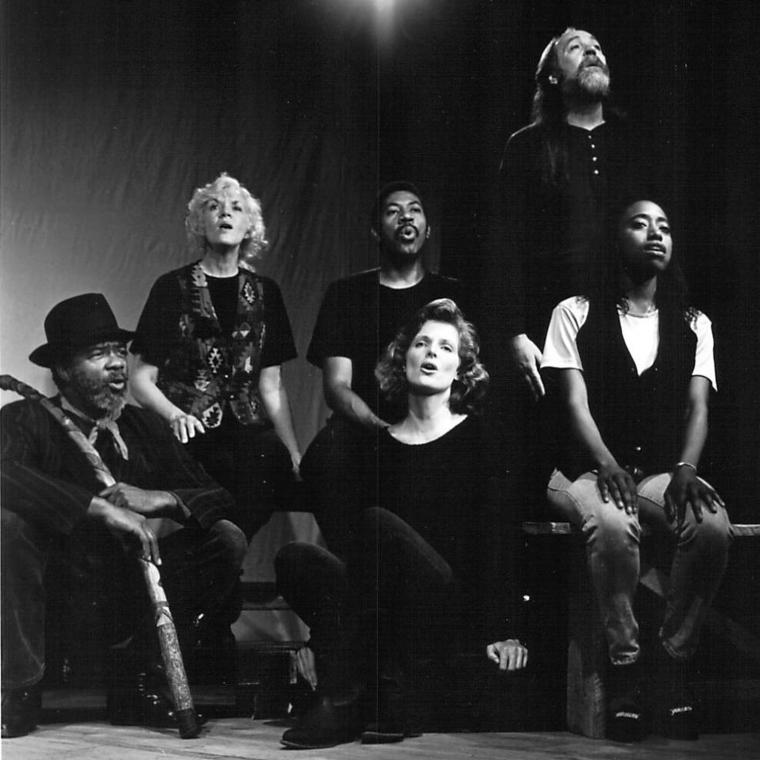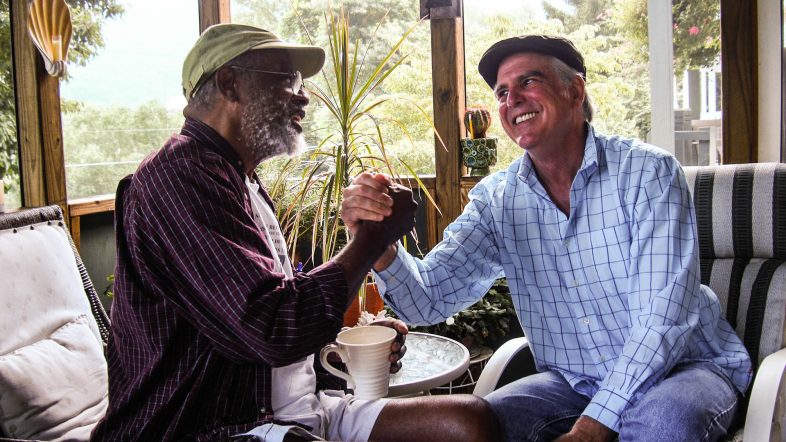In response to increasing KKK activity in the 1980s, Roadside and Junebug Productions began the Junebug/Jack collaboration, performing for each other’s home audiences – one predominately white, the other black, both low to moderate income. Photo: Roadside Archives. This article is part of the Creating Place project. View the full multimedia collection here.
By: Dudley Cocke (Whitesburg, KY) | April 25, 2018
August 9-11, 1976: the Highlander Research and Education Center in New Market, Tennessee hosted the “Appalachian and Southern Theater Workshop.” Highlander hadn’t done this kind of thing before, but its staff perceived some kind of thespian energy with a political bent stirring across the region.
I was there along with representatives of 14 other Southern theater companies and six unaffiliated theater artists. About half of those who made the trip to the top of the Highlander mountain left after the first day, when they realized the conversation was about how theater can be political; the departed had not understood that Highlander was a center for activism with a history stretching back to the 1930s Labor Movement and up through the 1950s and 60s Civil Rights Movement. Those of us who stayed on the mountain eventually founded Alternate Regional Organization of Theaters South or Alternate ROOTS. The six founding companies were Birmingham Festival Theater (AL), Florida Studio Theater (FL), Play Group (TN), Pocket Theater (NC), Roadside Theater (KY), and The American Revolutionary Road Company (TN).
The dictionary will tell you that a root is a part of the body of a plant that typically develops from the radicle and grows downward into the soil, fixing the plant and absorbing nutrients and moisture. The theater companies and freelance artists who founded ROOTS shared the “radicles” of the Southern Freedom and Anti-War movements; our nutrient was our Southern communities. It was also understood that our Southern soil was different from one place to the next – and that none was free from poisons.
If you were an activist that August at Highlander, you were packing baggage. For starters, one after another of your national leaders had been assassinated: Medgar Evers and John Kennedy, 1963. James Chaney, Michael Schwerner, and Andrew Goodman, 1964. Malcolm X, 1965. Martin Luther King and Robert Kennedy, 1968. Fred Hampton, 1969. Here’s the telling Wikipedia entry on Hampton’s assassination:
Hampton slept, unable to awaken as a result of the barbiturates the FBI infiltrator had slipped into his drink. He was lying on a mattress in the bedroom with his fiancée, who was eight-and-a-half months pregnant with their child. Two officers found him wounded in the shoulder, and fellow Black Panther Harold Bell reported that he heard the following exchange:
“That’s Fred Hampton.”
“Is he dead? Bring him out.”
“He’s barely alive.
“He’ll make it.”
Two shots were heard, which were later discovered were fired point blank in Hampton’s head. According to Johnson, one officer then said:
“He’s good and dead now.”
When the ROOTS charter was signed during the bicentennial celebration of the nation’s founding, the gap between the American Creed – “justice and equality for all” – and the American Deed appeared as wide as it always had been. As King had signified in 1967 when planning the 1968 Poor People’s March on Washington, we, too, believed powerful forces mustered by a relative few were trying to beat us into submission for the purpose of economic exploitation. Like Dwight Eisenhower and King, we identified a powerful military-industrial-political complex erected against democracy and set against the well-being of our communities.
My soon-to-become life-long collaborator John O’Neal, co-founder and artistic director of the Student Non-Violent Coordinating Committee’s Free Southern Theater, based in New Orleans, didn’t attend that first Highlander meeting, but sent a proxy; Linda Parris-Bailey, artistic director of Knoxville’s African American Carpetbag Theater did attend, but didn’t sign the original charter. The six companies that signed were all white. Some months later, when John O’Neal visited Highlander for a meeting with Myles Horton, the Center’s co-founder and director, Myles (who had a dry sense of humor) suggested John visit the upstart Appalachian Roadside Theater over in Whitesburg, Kentucky. Myles’ enticement: “Like your company, John, they appear to have a nationalist bent.” John picks up the story:
I met Dudley in 1977 in Florida, as I recall. Dudley said, “John, what did you think of our little play?” Now Myles Horton at Highlander had told me that Roadside was performing for poor and working class white people in Southern Appalachia, and near Knoxville, Tennessee is where the KKK was founded. So I said, “From what I understand about what y’all are doing, you have a lot of potential Klansmen in your audience, and, frankly, I didn’t see anything in your play that would make a potential Klansman less likely to be a Klansman than before he listened to your story.”
Now I had some experience working with white people, and I knew that this kind of aggressive, though polite, response had a tendency to push them up against the wall. And I liked to get them there and place needles in them, and hold them like specimens to see what they would do. Dudley, he didn’t miss a beat, said, “Hmmm. What do you think we ought to do about that, John?” Now I came there not planning on doing shit. I came to keep an eye on what the white people were doing. That’s what started the work that Dudley and I continue to this day.
John and I agreed to host each other’s plays in our home communities over a period of several years. For John and the Free Southern Theater, home was the Black Belt South of Louisiana and Mississippi; for Roadside, home was the rural, mostly white central Appalachian coalfields of eastern Kentucky, southwestern Virginia, southern West Virginia, and northeastern Tennessee. The performances became a way to learn about each other’s communities.
For Junebug and Roadside, people’s histories, songs, and stories, preserved and perpetuated in the African American and Appalachian oral traditions, are sources of inspiration for the plays. Staged without a fourth wall of separation from the audience, both companies welcome call-and-response in the auditorium. Without a curtain to draw, performances are naturally followed by informal story swaps among audience members and cast, and it wasn’t long before visiting artists were being invited by community members to their picnics, schools, and church services.
In some ways when John and I met, we were two peas in one pod: we were both from upper middle class families in our respective communities; we both – in my case, veered; in John’s case, turned – to social justice in our teens; we both studied philosophy in college; we were both conscientious objectors to the Vietnam War; and, in 1977, we were both trying to figure out what role theater could play in the social justice struggle.
The Civil Rights Movement had taught us that it was the sum of countless local actions that made a movement. As SNCC and the Free Southern Theater put it: “It’s not the size of the ship that makes the waves, but the motion of the ocean.” This primacy of place, of particular communities, in that movement was a given we shared with our ROOTS co-founders.
Roadside Theater started with several questions nagging its founders: Could a small group of community musicians, storytellers, and writers create a professional theater in a rural working class and poor region with no history of the same? Could the form and content of such a theater be fabricated from local sources? And could the ensuing local dramas appeal to people anywhere? The essays of Roadside’s down-river neighbor, Wendell Berry, encouraged us; as we began to invent our theater, his claim for the necessity of roots in an increasingly mobile, profit-obsessed culture was never far from our thoughts:
The regionalism that I adhere to could be defined simply as local life aware of itself. It would tend to substitute for myths and stereotypes of a region a particular knowledge of the place one lives in and intends to continue to live in.
Without a complex knowledge of one’s place, and without the faithfulness to one’s place on which such knowledge depends, it is inevitable that the place will be used carelessly, and eventually destroyed. I look upon the sort of regionalism that I am talking about not just as a recurrent literary phenomenon, but as a necessity of civilization and survival.
In its first decade, ROOTS became a regional and then national rallying point for this place-based artistic and political sensibility. Each member company was committed to creating new work through a dramaturgical process that reflected who they were and where they were. The 20 new plays of the American Revolutionary Road Company (the Road Company) based in Washington County, Tennessee mirror this desire to create work of, by, and for a specific place. Their play Horsepower: An Electric Fable (1978) was an allegory about the energy crisis facing the region’s citizens at the time when long lines and spiking prices at the gas pump were the result of US dependence on foreign oil. The play creation process included the company hosting public meetings where invited speakers from the Tennessee Valley Authority (the region’s quasi-government/quasi-private utility) and representatives from local organizations opposed to building nuclear power plants presented their views and heard audience comments. The performances, themselves, then became the occasion for further community debate about the pros and cons of nuclear power.
This engagement with public policy was part of the ROOTS DNA during its first decade. ROOTS leaders participated on the Southern Growth Policies Board, a high-profile interstate confederacy focused on the region’s future. ROOTS felt its contribution register when the Board’s 1986 Report concluded: The best way to buy shares of the future with guaranteed profit is to invest in the interdependent lives of Southerners themselves.
It was exactly this interdependence, which refused to homogenize race, class, and other differences, which laid the foundation on which Roadside and the Free Southern Theater (along with its successor Junebug Productions) would build their boundary-crossing collaborative productions. As the first decade of ROOTS came to a close in 1985, and despite Reagan’s election, Junebug and Roadside were moving forward across the country, engaging audiences with the dramatic emotion, spirit, and ideas in their co-created plays.
This engagement’s highest barrier was attracting an audience that looked like the host’s whole community. The vast majority of people in any community don’t attend professional theater, much less cross lines of race and class for such events. We eventually bridged this barrier by requiring each community that presented the plays to create an ecumenical community choir of individuals drawn from local organizations where singing was a habit. Singers from different church denominations were typically the first to volunteer. Each new choir rehearsed the play’s music for weeks before Junebug and Roadside arrived, when then the choir members were staged into the production.
Naturally, the wide community turned out for the performances, excited to see their own on the main stage. From that stage, they were greeted by a soulful new sound emanating from their own community. These stirring performances were followed by story circles in which audience members and cast took up the productions’ themes of race, place, and class within a set of protocols which allowed each person’s story to be respectfully heard by the others in the circle. There was so much excitement around those frank personal accounts being told in public for the first time that some communities went on to create their own interracial dramas. In all communities that presented the Junebug-Roadside work, the social effect was positive; unfortunately, such community-based residencies would soon become a memory, because the ensuing culture wars instigated by the white supremacist right-wing shut down of the National Endowment for the Arts’ touring and presenting program.
Today, we have a seeming myriad of terms for artistic practice that centers community and place: “Creative Placemaking,” “Art for Development,” “Creative Placekeeping,” “Creative Economy,” and “Social Practice.” We have “Community-Based Theater,” “Teatro Sociale,” “Applied Theater,” “Theater for Development,” and more. All these terms, however, must answer the same question ROOTS was asking in 1976: Who benefits?
Since then the divisions between the wealthy and the rest have grown wider: in 1967, the 1 percent controlled 27% of wealth in the US; today the 1 percent control 42% of the wealth, sharpening our unremitting issues of race and class. What is the same: a lack of national will to address these problems, although some of the solutions are known. Forty-two years after ROOTS founding, we remain a deeply divided nation.
. . .
 Dudley Cocke, writer, stage director, and producer, is the artistic director of Roadside Theater, theater wing of the award-winning rural arts and humanities center Appalshop in Whitesburg, Kentucky. The 43 year-old Appalachian ensemble theater has toured its original plays in 45 states and Europe. Dudley is the recipient of the 2002 Heinz Award for Arts and Humanities and recently The Randy Martin Spirit Award.
Dudley Cocke, writer, stage director, and producer, is the artistic director of Roadside Theater, theater wing of the award-winning rural arts and humanities center Appalshop in Whitesburg, Kentucky. The 43 year-old Appalachian ensemble theater has toured its original plays in 45 states and Europe. Dudley is the recipient of the 2002 Heinz Award for Arts and Humanities and recently The Randy Martin Spirit Award.


